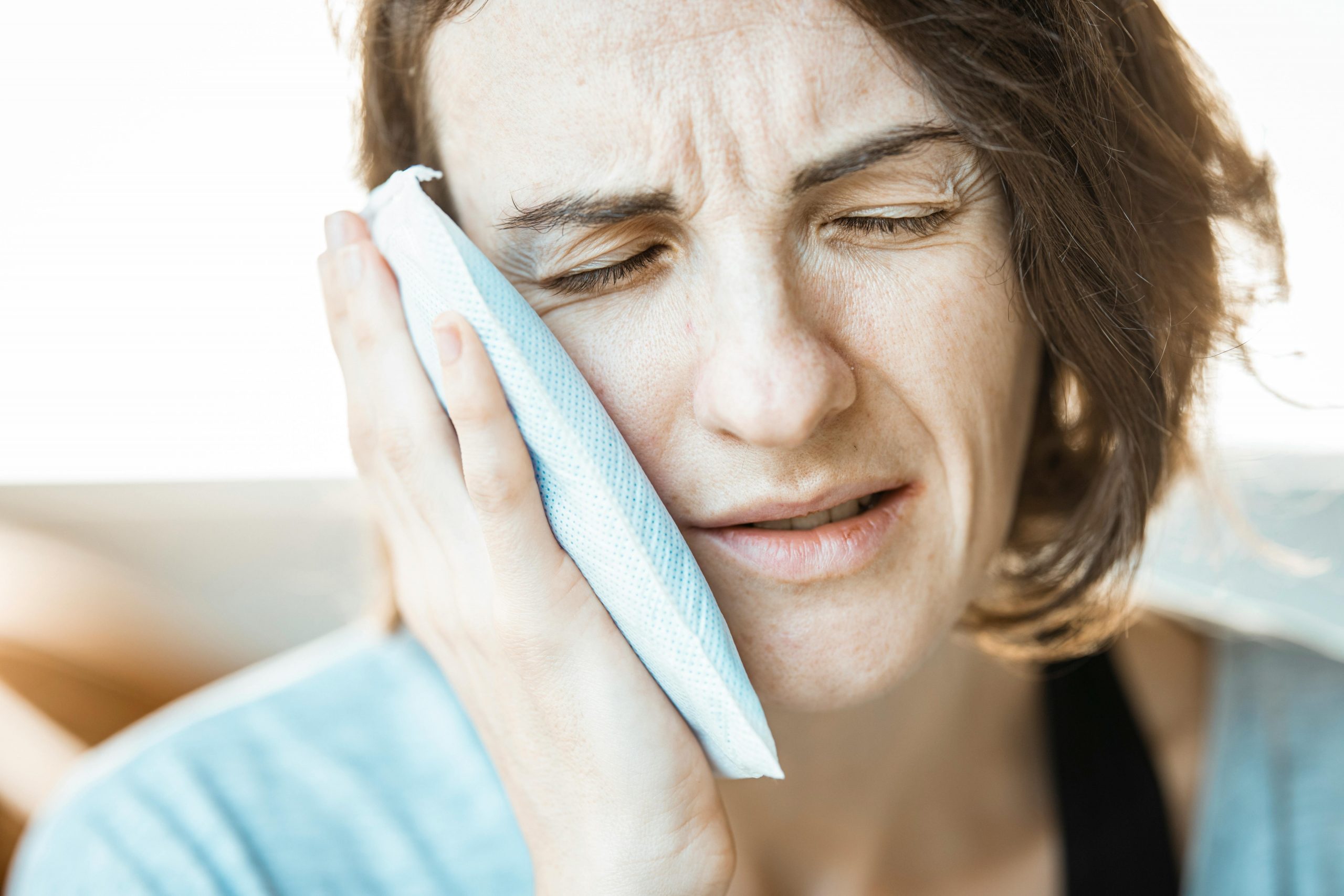
When you’re sick, body aches, fatigue, and fever are expected—but what surprises many people is tooth pain. If your teeth hurt when you’re sick, you’re not alone. The discomfort can range from dull pressure to sharp pain that makes eating or brushing unbearable. Understanding why this happens can help you find fast relief and protect your oral health in the long run.
This guide explains why your teeth may hurt when you’re sick, what symptoms to look for, and how to ease the pain safely at home.
Why Do Teeth Hurt When You’re Sick?

Tooth pain during illness isn’t always a sign of a dental issue. Often, the problem comes from how your illness affects your sinuses, nerves, or hydration levels. Here are the most common reasons:
1. Sinus Pressure and Congestion
- Your upper teeth share roots close to your sinus cavities.
- When you’re congested from a cold, flu, or sinus infection, the swollen sinuses press on these roots, causing pain or sensitivity in your upper molars.
- The pain may worsen when you bend forward or lie down.
How to relieve it:
- Use a warm compress over your sinuses to reduce swelling.
- Stay hydrated and use saline sprays to clear congestion.
- Over-the-counter (OTC) decongestants or antihistamines can help reduce sinus pressure.
2. Fever and Inflammation
When you’re running a fever, your body’s inflammatory response increases. This inflammation can:
- Heighten tooth sensitivity.
- Make existing dental issues, like cavities or gum disease, more painful.
Tip: Drinking plenty of fluids and using anti-inflammatory medication (like ibuprofen) can help reduce swelling and pain.
3. Dehydration and Dry Mouth
Illnesses often lead to dehydration, especially when you have vomiting, diarrhea, or a fever. Many cold medications—like antihistamines and decongestants—also dry out your mouth.
Why this matters:
- Saliva helps wash away bacteria and neutralize acids.
- When your mouth is dry, bacteria thrive, leading to gum irritation and tooth sensitivity.
Relief tips:
- Sip water regularly, even when you don’t feel thirsty.
- Chew sugar-free gum to stimulate saliva.
- Avoid caffeine and alcohol, which worsen dryness.
4. Jaw Clenching or Teeth Grinding
Being sick can make you tense, and that tension often shows up in your jaw. Grinding or clenching (bruxism) increases tooth sensitivity and can cause dull, aching pain.
What helps:
- Massage your jaw muscles to relax tension.
- Use a warm compress on your cheeks.
- If you grind your teeth often, consider wearing a mouthguard at night.
5. Infection-Related Tooth Pain
Sometimes, tooth pain while sick indicates a secondary infection.
If you already have a cavity, gum disease, or dental abscess, your immune system being weakened by illness can make it flare up.
Watch for these signs:
- Persistent, throbbing pain in one area.
- Swelling of the gums or face.
- Sensitivity to hot or cold that doesn’t go away.
If these symptoms appear, call your dentist—you might need antibiotics or dental treatment.
Common Illnesses That Cause Tooth Pain

1. Cold or Flu
Congestion, sinus pressure, and inflammation are common culprits. Even mild colds can irritate the nerves near your upper teeth.
2. Sinus Infection (Sinusitis)
A sinus infection is one of the top reasons people experience tooth pain when sick. When the sinuses fill with fluid and become inflamed, it can feel like a severe toothache.
Symptoms that mimic tooth pain include:
- Pressure behind the eyes or cheeks.
- Pain that worsens when leaning forward.
- Congested nasal passages.
3. Ear Infection
Because the ear, jaw, and teeth share nerve pathways, an ear infection can radiate pain to the mouth. The discomfort is often felt on one side only.
4. Strep Throat or Tonsillitis
Swelling and inflammation in your throat can make nearby lymph nodes and jaw muscles tender, which might make your teeth ache or feel sensitive.
5. COVID-19 or Other Viral Infections
Though not as common, some viral infections can trigger inflammation in the mouth and gums, leading to mild tooth sensitivity or soreness.
How to Tell If It’s Sinus Pain or a Tooth Problem
It’s easy to confuse sinus pain with an actual dental issue. Here’s how to tell them apart:
| Feature | Sinus-Related Pain | Tooth-Related Pain |
| Location | Usually in upper back teeth | Can occur in any tooth |
| Type of Pain | Dull, pressure-like | Sharp or throbbing |
| Triggers | Worsens when bending or lying down | Worsens when chewing or with hot/cold |
| Other Symptoms | Congestion, headache, fever | Swelling, cavity, or gum tenderness |
If pain continues after your sinus symptoms clear up, it’s likely a dental issue that needs professional care.
Home Remedies for Tooth Pain When Sick
While you recover, these home remedies can help you feel more comfortable:
1. Warm Salt Water Rinse
- Mix 1 teaspoon of salt with warm water.
- Swish for 30 seconds to soothe gums and kill bacteria.
- Repeat several times daily.
2. Use a Humidifier
Dry air can worsen sinus and mouth dryness. Running a humidifier, especially at night, helps relieve pressure and keep your mouth moist.
3. OTC Pain Relief
Non-prescription pain relievers like acetaminophen or ibuprofen can help with both sinus and dental pain. Follow dosage instructions carefully.
4. Steam Inhalation
Inhaling steam helps clear nasal passages and relieve sinus pressure. Add a few drops of eucalyptus oil for extra relief.
5. Maintain Oral Hygiene
Even when you’re sick, brushing and flossing are crucial. Use a soft-bristled toothbrush if your gums or teeth feel sensitive.
When to See a Dentist
Tooth pain that lasts more than a few days—or worsens even after your illness improves—shouldn’t be ignored. You may need professional evaluation if:
- Pain is localized to one tooth.
- Your face or gums are swollen.
- You notice pus or drainage near a tooth.
- OTC remedies don’t help.
Important: Even if your illness caused the pain, dental infections can develop quickly. Seeing a dentist ensures nothing more serious is going on.
Preventing Tooth Pain During Illness
Keeping your mouth healthy all year long is the best way to avoid tooth pain when you’re sick. Illnesses can throw your body off balance—causing dehydration, sinus pressure, and inflammation that affect your teeth and gums. By maintaining consistent oral care habits and making a few mindful choices when you’re not feeling well, you can prevent much of this discomfort before it starts.
Here’s a closer look at simple but effective prevention strategies to protect your teeth and gums during illness:
1. Stay Hydrated
When you’re sick, your body loses fluids more quickly due to fever, congestion, or medications like decongestants and antihistamines that dry out your mouth. A dry mouth means less saliva—your body’s natural defense against bacteria and acid buildup.
Why it matters:
- Saliva washes away food particles and neutralizes acids that cause decay.
- Dehydration can lead to bad breath, tooth sensitivity, and gum irritation.
How to stay hydrated:
- Sip water throughout the day, even when you don’t feel thirsty.
- Avoid caffeine and alcohol, which worsen dehydration.
- If you’re vomiting or sweating a lot, consider electrolyte drinks to restore balance.
2. Avoid Sugary Cough Drops & Medications
Cough drops, throat lozenges, and liquid medications often contain sugar for taste—but that sugar can stick to your teeth and feed bacteria. Frequent use increases your risk of cavities, especially if you’re sucking on lozenges all day while sick.
Healthier alternatives:
- Choose sugar-free cough drops or lozenges made with xylitol, which can actually reduce bacteria.
- Rinse your mouth with water after taking any syrup-based medicine.
- Brush your teeth before bed to remove residue from medications.
3. Keep Up Oral Hygiene
Even when you’re exhausted or congested, maintaining your oral hygiene routine is essential. Skipping brushing or flossing allows bacteria to multiply rapidly, especially if your immune system is already weakened.
Daily oral care checklist:
- Brush at least twice a day with a soft-bristled toothbrush.
- Use fluoride toothpaste to strengthen enamel.
- Floss once daily to remove plaque between teeth.
- If brushing makes you gag while sick, use an alcohol-free mouthwash as a temporary alternative.
4. Replace Your Toothbrush After Illness
Once you recover, replace your toothbrush—or sanitize an electric toothbrush head—immediately. Germs can linger on bristles and potentially reinfect you or spread illness to family members.
To stay protected:
- Replace your toothbrush every 3 months, or sooner if you’ve been sick.
- Store it upright and uncovered to allow proper air drying.
- Never share toothbrushes, even with family members.
5. Visit Your Dentist Regularly
Regular dental checkups are one of the best ways to catch small issues before they become painful problems during an illness. Your dentist can identify early signs of cavities, gum disease, or enamel erosion—conditions that can worsen when your immune system is compromised.
Recommended schedule:
- See your dentist every 6 months for cleaning and examination.
- Schedule an appointment sooner if you experience tooth sensitivity, gum swelling, or persistent bad breath.
- Ask about fluoride treatments or sealants if you’re prone to sensitivity or decay.
6. Support Your Immune System
A strong immune system supports oral health, too. When your body can fight off infections effectively, your gums and teeth are less likely to become inflamed or painful during sickness.
Simple ways to boost immunity:
- Eat a balanced diet rich in fruits, vegetables, and lean proteins.
- Get enough sleep—your body heals and restores during rest.
- Avoid smoking, which weakens both your immune system and your gum tissue.
7. Manage Sinus Health
Since sinus pressure is one of the top reasons your teeth hurt when you’re sick, keeping your sinuses clear can prevent future pain.
Tips for sinus care:
- Use a humidifier to keep indoor air moist.
- Try saline sprays or steam inhalation to open nasal passages.
- Avoid allergens or irritants that cause chronic congestion.
The Connection Between Oral Health & General Health
Your mouth and body are closely linked. When your immune system is under stress, your mouth can show the first signs.
- Gum inflammation can worsen during illness.
- Bacteria in the mouth can affect your recovery time.
- Maintaining good oral hygiene helps your body heal faster.
So the next time you feel under the weather and notice tooth pain, remember—it’s your body’s way of signaling that everything is connected.
Final Thoughts
If your teeth hurt when you’re sick, don’t panic—it’s often temporary and linked to sinus pressure, inflammation, or dehydration. However, persistent or localized pain should always be checked by a dentist to rule out infections or other oral health problems.
Taking care of your teeth, even when you’re feeling down, helps you heal faster and keeps your smile healthy long after you recover.

